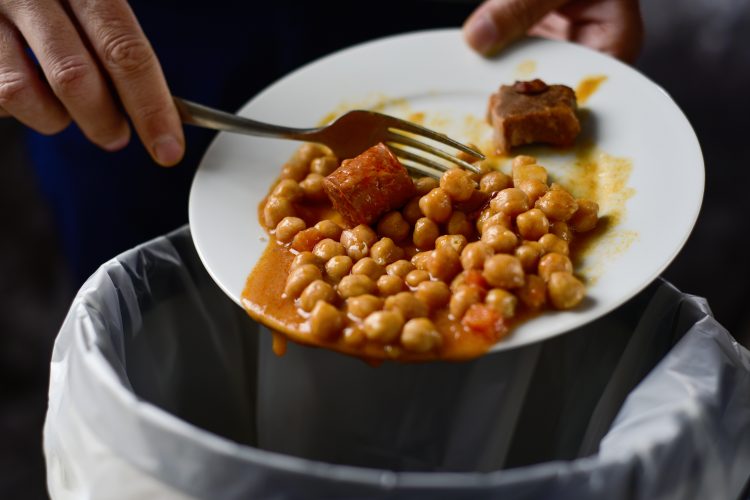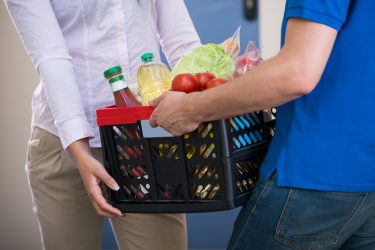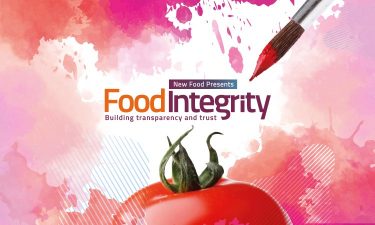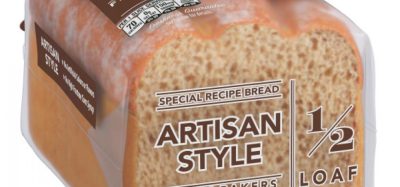Waste not, want not
- Like
- Digg
- Del
- Tumblr
- VKontakte
- Buffer
- Love This
- Odnoklassniki
- Meneame
- Blogger
- Amazon
- Yahoo Mail
- Gmail
- AOL
- Newsvine
- HackerNews
- Evernote
- MySpace
- Mail.ru
- Viadeo
- Line
- Comments
- Yummly
- SMS
- Viber
- Telegram
- Subscribe
- Skype
- Facebook Messenger
- Kakao
- LiveJournal
- Yammer
- Edgar
- Fintel
- Mix
- Instapaper
- Copy Link
Posted: 27 March 2020 | Bethan Grylls (New Food) | 1 comment
New Food’s Editor, Bethan Grylls, speaks to entrepreneur and food preservationist Saasha Celestial-One about the consequences of our wasteful habits.


Wasting food has become normalised, according to Saasha Celestial-One, Co-Founder & COO of food waste app, OLIO. “The shocking truth is that a third of food produced is never eaten – around $1.2 trillion per year. To put that into perspective, in the US, 1.3 percent of the GDP is food waste.”
This wastage is not only a massive market inefficiency, but it is also extremely bad for the environment. “The food supply chain accounts for 24 percent of global carbon emissions from farm to fork,” Celestial-One explained. “When a third of that food is discarded, eight percent of global carbon emissions are directly associated with the food waste in our food system.”


OLIO helps reduce food waste by connecting neighbours with one another and with local businesses, so that surplus food can be shared instead of discarded
The reasons behind this high level of waste varies along the supply chain, she continued, from food being tossed at farm-level due to cosmetic reasons, to more disposable income and cheaper produce. In the UK, WRAP estimates that 71 percent of food waste actually takes place in the consumer’s home, despite the fact this goes against our ‘animal instinct’ to accumulate, horde and value things with nutritional value.
We live in a “convenience culture”, she added; a world where people really value ease and spontaneity, such as the ability to order a takeaway meal at the last minute. “We’re more isolated than ever before. Traditionally, women have cooked together, prepared communal meals. Now, over half of all meals in the UK for adults are eaten alone, so portion sizes are tricky to gauge.” She also noted that a lot of people wait to throw food away until it is inedible, which relieves an element of guilt. “Not a lot of people will look at a perfectly good bag of spinach and bin it. They wait until it’s wilted and say: ‘well it’s gone off now, it needs to be thrown’.”
She continued: “Most businesses are strongly incentivised to reduce food waste wherever they can because they’re trying to run a profitable organisation, but inevitably, differences in supply and demand will result in surplus food existing at various points along the supply chain.”
OLIO
OLIO specialises in reducing food waste by connecting neighbours with one another and with local businesses, so that surplus food can be shared instead of discarded. This could be, for example, food nearing its sell-by date in local stores, spare home-grown vegetables, or the groceries left over in your fridge when you go away.
The business was co-founded by Tessa Clarke and Celestial-One after a “lightbulb moment” in 2014. Clarke had been packing up her apartment in Switzerland in preparation for moving back to the UK. Although her family had tried to eat everything they had, there was still a lot of perfectly edible food left over. The removal men had told Clarke the food had to be thrown, but Clarke was reluctant to waste it. She considered knocking on neighbours’ doors to see if they would be interested, but they might not be at home, or if they didn’t want her food, both parties may have felt awkward. In her anguish, she thought ‘why isn’t there an App for this?’
Clarke told Celestial-One about her idea, who had had a similar upbringing: to truly value food. “I was raised by what I might call hardcore hippies in rural America,” Celestial-One told New Food, “I grew up in a large family that wasn’t very well off. My mum was incredibly resourceful about making ends meet and I would support her by collecting things that other people had thrown away.”
Coranovirus
Currently, we are in the midst of a coronavirus outbreak, with countries across the world initiating a ‘lockdown’ period. This means, among other things, that contact with those outside your household is ill-advised. As Olio relies on communities working together, it has issued a range of advice on its website which can be found here on how to continue sharing food with others safely. The advice applies to the UK, so if you are ‘OLIO-ing’ outside of the UK, ensure that you follow local Government guidance.
Organuary
Alongside businesses such as OLIO and schemes that companies are rolling out, charities are also getting involved in the fight against food waste. One notable example is ‘Organuary’ which asks people to include organ meats in their diet throughout January. Once a common part of the human diet, organ meats are now a rarity on our dinner plates. In 1974 the average person ate 50g of organ meat a week, but by 2014 this had decreased to a mere 5g per week.1 According to Organuary, this downward trend has resulted in lots of wasted food from livestock.
The problem is that livestock accounts for approximately 14.5 percent of global greenhouse gases2 so wasting parts of the animal could be considered irresponsible. Research has uncovered that if we increase our consumption of organ meats to twice a week, global greenhouse gases produced from livestock could be reduced by up to 12.5 percent.3
“I am a lifelong vegetarian so I can’t speak from direct experience,” Celestial-One commented on Organuary, “but for meat eaters it makes sense. Whether it’s a cow or a pumpkin, we should be extracting as much value from that resource as we can.”
She expanded: “We have more than enough food to feed everyone. You could feed all of the 800 million malnourished people in the world on the portions of food that are thrown away in the US and UK. For me, it’s immoral and borderline criminal to waste resources like that. We need to get creative.”
Use-by and best-before dates
There is also a lack of education regarding shelf life and expiration dates. “The European Commission estimates that 10 percent of food wastage is directly due to misunderstanding or misinterpretation of date labels,” Celestial-One highlighted.
Best-before labels, in particular, are incredibly confusing because many consumers believe them to be equivalent to use-by dates; as soon as that best-before date passes, perfectly adequate food is often thrown away for fear that it will cause illness. In reality, all ‘best before’ means is that the food will taste nicer prior to that date.
“There is good reasoning behind most use-by dates, but in some instances even these are unnecessary – I’ve seen labels on items like apples and lemons, for example,” Celestial-One added. “We need to start changing behaviours where possible. We want the next generation to think about food differently.” She suggested that the school curriculum would be a good place to start and noted that some schools are starting to teach such lessons.
“My son is seven and he’s certainly learning so much more about carbon emissions and pollution. He is going to grow up with a very different understanding of how his actions impact the environment than our generation.”
Food waste and responsibility
“The scale of the food waste problem has got out of control,” Celestial-One said. “It is therefore everyone’s responsibility to do something about it. It is more of a threat than it has ever been, so we cannot wait for any single actor to take the lead. Individuals need to take responsibility for their own food waste – we’re not asking for everyone to magically start fermenting pumpkins, or doing things that don’t fit in with a modern lifestyle, but we can do the basics: shop less, meal planning…and if you’re not going to eat it, put it on an App like OLIO so that someone nearby can eat it, instead of going out to buy brand new food. There’s no reason there should be edible food along the supply chain going to waste!
“I want to show industry that there is a safe and responsible way to redistribute surplus food. If we have the right systems, processes and safeguards in place, then we can take a vast quantity of food that was previously considered not edible, but that is actually perfectly safe, and redistribute it using modern technology.”
Celestial-One is one of the many expert speakers who was due to speak at Food Integrity in March and she is hoping to speak on one of the newly confirmed dates. As you may have heard, the event was postponed due to the recent escalation of events related to COVID-19.
Food Integrity will now be taking place between the 29-30 September in the same venue as originally planned (Twickenham Stadium, London, UK). We appreciate your understanding in these unprecedented times. Please contact us with any questions you may have.


References
- https://www.gov.uk/government/collections/family-food-statistics
- http://www.fao.org/news/story/en/item/197623/icode/
- https://pubs.acs.org/doi/abs/10.1021/acs.est.8b06079
Biography


Related topics
Environment, Food Waste, Hygiene, Shelf life, Sustainability, The consumer, Trade & Economy










Very nice article! :))